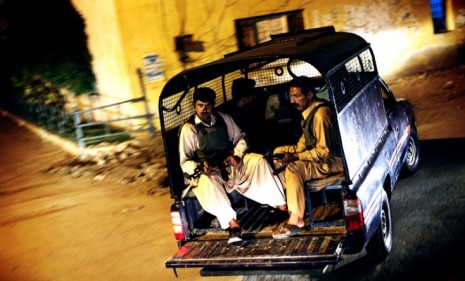Pakistan's diplomatic 'hardball': What should the U.S. do?
Pakistan gives the U.S. an ultimatum: Get the CIA out of the country and curb your al Qaeda-targeting drone attacks... or else

Pakistan is a central battleground in the war against al Qaeda, and it's now playing "hardball" with the Obama Administration, says Bruce Riedel in Newsweek. Pakistan is feeding off anger over CIA contractor Raymond Davis' shooting of two Pakistanis in January, and capitalizing on its power over a key supply route for NATO forces in Afghanistan, not to mention its growing nuclear strength. It's insisting that the U.S. withdraw hundreds of its CIA workers and special-ops troops, and sharply limit Predator drone attacks on Islamist militants. How should the U.S. respond to these demands from its putative ally? Here, four suggestions:
1. Play hardball right back
If Pakistan is going to throw down, the U.S. can match it, and then some, says The Wall Street Journal in an editorial. Team Obama should "inform its friends in Islamabad that, when it comes to this particular fight, the U.S. will continue to pursue its enemies wherever they may be, with or without Pakistan’s cooperation." They can "cooperate in that fight and reap the benefits of and American alliance," or not. If Pakistan chooses to "oppose the U.S.," it will lose its generous military aid and force the U.S. to form "a more robust" military alliance with arch-enemy India.
The Week
Escape your echo chamber. Get the facts behind the news, plus analysis from multiple perspectives.

Sign up for The Week's Free Newsletters
From our morning news briefing to a weekly Good News Newsletter, get the best of The Week delivered directly to your inbox.
From our morning news briefing to a weekly Good News Newsletter, get the best of The Week delivered directly to your inbox.
2. Disengage as much as possible
A "very nasty divorce" doesn't serve the U.S. or Pakistan very well, says Trudy Rubin in The Philadelphia Inquirer. But our "frayed alliance" with Islamabad poses serious problems for the war against al Qaeda and the Taliban. There are no easy solutions, since "paranoia" is rampant in Pakistan's powerful army and intelligence agency over India, the future of Afghanistan, and phantom U.S. designs on its nukes. Those suspicions make the military "nearly impossible" to deal with. Our best option, then, is "to lessen U.S. dependence on Pakistan" to whatever extent we can.
3. Cooperate with Pakistan's military
Pakistan has some legitimate complaints about U.S. drone strikes that occasionally hit civilians, says Myra MacDonald at Reuters. But the answer isn't ending the attacks or going "it alone without Pakistani help." The drones need "good intelligence on the ground," and the U.S. lacks "the kind of cultural expertise and linguistic skills" to make all the right targeting calls. So instead of "dumbing down the debate on drones" to a "'with us or against us' dichotomy," we should engage the army in "a discussion of how and when Predator drone strikes might or might not be effective."
A free daily email with the biggest news stories of the day – and the best features from TheWeek.com
4. Undermine Pakistan's military
We can't trust Pakistan's army or intelligency agency as long as they continue "playing both sides of the war on terror," says Riedel in Newsweek. But at the same time, "Washington knows it needs Pakistan, no matter how frustrating and irritating the relationship may be." So Obama has to try and "strengthen those forces in Pakistan that want to get out of the endless rivalry with India," like President Asif Ali Zardari. If successful, that would essentially "end Pakistan's dance with terror."
-
 Do audiobooks count as reading?
Do audiobooks count as reading?Talking Point Queen Camilla insists listening is legitimate but a snobbery remains that’s hard to shift
-
 The end for central bank independence?
The end for central bank independence?The Explainer Trump’s war on the US Federal Reserve comes at a moment of global weakening in central bank authority
-
 Woolf Works: the Royal Ballet’s ‘inspired’ production’
Woolf Works: the Royal Ballet’s ‘inspired’ production’The Week Recommends Wayne McGregor’s three-act show brings Virginia Woolf’s creative world ‘vividly’ to life